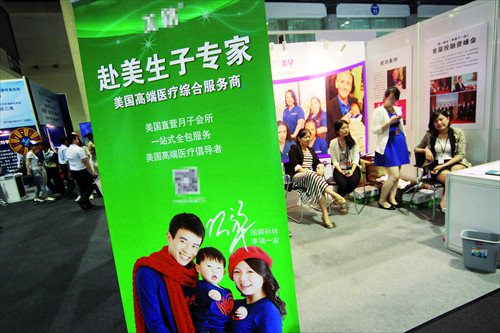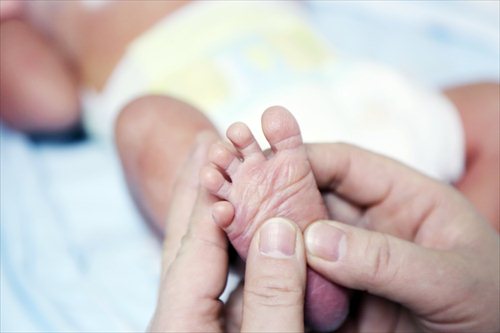Shanghai court finds against maternity tourism company
When Miss Liang was eight-month pregnant in March last year, she cancelled her contract with a Shanghai-based consulting company for a three-month maternity tourism package in California, US.
The company, Meilü, is the Shanghai office of a US operator "USA Happy Baby, Inc" (UHBI). Miss Liang had selected it from a slew of operators that mainly look after pregnant Chinese women wanting to have their babies born in the US.
When the company faced the possibility of criminal charges after its Rancho Cucamonga venue in California became one of the 20 "maternity centers" raided by federal investigators over possible visa, marriage and tax frauds, the young mother-to-be wanted out.
According to a news release from Shanghai No.1 Intermediate People's Court, she did so out of real concern. From what she read on news websites, pregnant women at the company's center had been forced to move, or were even made homeless. She was worried that the promised package would no longer be valid.

An immigration agency advertises maternity tourism packages at an immigration service fair in 2014. Photo: CFP
"Wailing babies"
Other news reports mentioned "wailing babies", suggesting that even newborn babies were also being affected by the raids.
At that stage, Miss Liang had already paid a deposit of 36,000 yuan ($5,565) to Meilü - 30 percent of the overall cost. She went to the company's city office several times hoping to cancel the contract but getting no satisfaction there she applied to a local court, asking that the contract be cancelled and she be awarded 72,000 yuan in compensation.
The court found for the company but recently, the Shanghai No.1 Intermediate People's Court delivered its ruling on her appeal, saying that Miss Liang was entitled to have the contract canceled and receive a refund of 48,000 yuan. The ruling was based on the concept of the right of a plaintiff to be confident that a contract will be properly fulfilled.
The judge, Pan Chunxia, explained that the concept meant that a party to a contract can cancel the contract if there was evidence that the other party might not be able to fulfill their side of the agreement. Evidence has to be produced that the party is unable to meet its contractual obligations and this evidence can include proof of a serious decline in business, asset transfers and capital withdrawals in the hope of avoiding debt, and loss of business credibility.
Pan said that both the official website, which Miss Liang listed, and the company's own reports made it clear that the US federal investigation affected its clients' plans, and the struggling business might no longer be able to fulfill its obligations. It was also the case that the potential loss of confidence in the business occurred after the contract had been signed in January.

A healthy newborn baby is the hope of every family. Photo: CFP
Meilü argued that UHBI has two US branches, and Miss Liang would have been sent to the one in Irvine, Orange County, which was not under federal investigation.
However, the contract did not specify that Miss Liang would be taken to the "safe" Irvine residence, though the contract could have suggested this by the way that the facilities and transportation had been described in the contract. However, after the raid, the company did not offer any evidence to allay Miss Liang's doubts and fears. Meilü is still operating.
The bigger picture
According to USA Today, the number of Chinese citizens heading to the US to give birth is probably tens of thousands each year, with each trip (including medical expenses) costing between $20,000 and $80,000.
Gary Chodorow, a China-based US immigration lawyer, said this kind of "tourism" had become more popular than the US immigration program that lets wealthy applicants gain American residency by investing at least $500,000 in a US business - when children born in the US turn 21, they can sponsor their parents to become legal US residents.
A GQ China feature from 2014 offered an in-depth report on the booming maternity tourism business in Los Angeles - it estimated that there are at least 700 operators there.
"When I queued for customs, there were at least four pregnant Chinese women in front of me. They were breathing carefully and trying to look relaxed," the journalist, He Tao, wrote.
In one Los Angeles residential community he visited, 80 to 90 percent of the 800-plus apartments had been taken by Chinese maternity tourists. "It doesn't look any different from a small Chinese town. I visited supermarkets, restaurants and hair salons and everyone I saw had a Chinese face. I passed a Sichuan restaurant, where the owner spoke in the authentic Chengdu dialect," He wrote.
To this day, the journalist still gets messages on his Sina Weibo site, from people asking him about good maternity tourist operators.
It is not illegal for foreign nationals to give birth in the US. The problem with many maternity tourism operators, however, is that they instruct their clients to deceive the federal government on visa applications and other official documents. Clients are told to wear loose garments at airports to hide their pregnancies to avoid making their purpose in visiting the US obvious. If they are discovered to be doing this they will be deported.
But the restrictions in the US have not stopped local citizens from having babies born there. A Mr Zhang, who works in show business, told the Global Times that last July his wife gave birth in California using a maternity tourist company's Shanghai branch. He said everything went well, adding that his wife "had a good time shopping" in the US before returning.
"She was leaving in May, so of course the news of the LA raids alarmed us. But the company told us that the operators who had been charged with committing criminal offences had broken laws by cheating and claiming welfare benefits, in order to reduce their medical bills. We weren't trying to cut prices at all, so it didn't seem to be a problem," Zhang said.
Word of mouth
He said that it was difficult to choose an operator out of the huge pool, and he eventually relied on friends and colleagues who had experienced successful maternity tourism packages, rather than trusting posts and articles online, no matter how detailed and convincing.
Mr Zhang said he and his wife were planning a second child and would probably use the same company again. "For us this is not about immigration. I just want to offer my children the opportunity of being able to choose citizenship when they become adults, instead of just accepting the traditional path they have," he said.
He said his wife had many friends who had complained of "nasty" doctors and nurses in China who made their childbirth experiences more painful than they should be.
"In the US hospital, my wife felt respected and cared for, and doesn't recall childbirth as a nightmare. I am happy about this. That is as important as the future of our child," Zhang said.
Newspaper headline: A win for a mum!